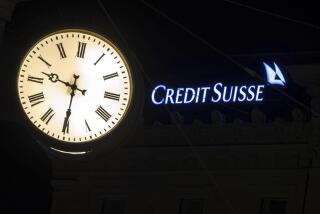France Proposes Bailout for Star-Crossed Credit Lyonnais : Finance: Bank has racked up losses of $10 billion, partly through Hollywood ventures. Plan faces intense opposition.
- Share via
PARIS — The French government unveiled a controversial plan Friday to bail out Credit Lyonnais from losses of roughly $10 billion that are blamed on mismanagement and risky loans stemming in part from its ill-fated foray into Hollywood.
Finance Minister Edmond Alphandery said the government will give the 132-year-old state-run bank--Europe’s largest bank--five years to “shake off the burden of past losses” and prove itself successful enough to survive without government help.
“I’m confident in the ability and determination of this great company to get there,” he said.
The bailout plan, largely leaked to the news media in advance, involves selling off about $26 billion of the bank’s assets--mostly non-banking enterprises, including the Santa Monica-based Metro-Goldwyn-Mayer movie studio.
It was unclear whether Credit Lyonnais under the new structure would be able to make the case that it should not have to sell MGM by its 1997 deadline. The timetable is set by U.S. laws requiring banks to divest non-banking assets they seize.
Some officials have been quietly saying that they hoped to convince bank regulators that the deadline should be lifted because the studio is being spun off into a non-banking company. But according to the Credit Lyonnais plan, the new company would still be a subsidiary of the bank. Banking lawyers have previously said it would probably be difficult to lift the 1997 deadline if the bank in effect still controls MGM, which is being rebuilt.
A bank spokesman said Credit Lyonnais’ plan to rebuild MGM before it is sold remains in place.
Credit Lyonnais seized MGM in 1992 after its former owner, Italian financier Giancarlo Parretti, defaulted on his loans. In mid-1993, the bank hired former Paramount Pictures Chairman Frank Mancuso as MGM chairman to rebuild the company, which this year is betting on such high-profile films as “Rob Roy” and the new James Bond film “Goldeneye.”
Alphandery indicated that the bank’s 1994 losses, to be announced next week, will total about $2.4 billion at current exchange rates, higher than expected.
Coinciding with Alphandery’s news conference, the bank, which grew to be Europe’s biggest through an all-out expansion drive in the late 1980s, announced a “particularly rigorous” four-year austerity program, consolidating operations around its core banking activities and trying to improve productivity by 15%.
Credit Lyonnais President Jean Peyrelevade, appointed two years ago to clean up the mess, said the program would eliminate 1,500 of the bank’s 38,000 staff positions by the spring of 1996. He denied union claims that 7,000 posts would be cut.
Alphandery said the conservative government is confident that the bailout plan would cost taxpayers nothing. Several Parliament members have questioned that pledge and urged hearings.
Alphandery said selected assets would be placed with a semi-independent consortium, then sold off over a period of years. The target is to sell 80% of the designated holdings within five years.
Assets to be sold other than MGM include the bank’s real estate portfolio, most of its industrial holdings and its financial subsidiaries--including Altus Finance, Societe de Banque Occidentale and Banque Colbert.
Alphandery estimated that the asset sales would produce a loss of $10 billion. Credit Lyonnais would pay back the state 60% of every $200 million in pretax profits earned to compensate for the loss.
The biggest loss-making sector, which had liabilities of $5.6 billion, is the group’s real estate holdings. Credit Lyonnais Nederlanden Bank, which financed the ill-fated MGM acquisition, showed a deficit of $2 billion. The financial subsidiaries had a $1.8 billion deficit.
Alphandery said the goal is to return Credit Lyonnais to the ranks of profitable banks without distorting competition in European banking.
The plan has already come under intense criticism, both from rival banks fearful of unfair competition and from politicians worried that taxpayers would fund the bailout. Legislative leaders have urged Parliament to debate the plan, and the National Assembly’s Finance Commission summoned Alphandery to a hearing March 28.
Pending announcement of the rescue plan, which got a tentative green light from the European Commission this week, the bank’s non-voting shares were suspended on the Paris bourse, as were shares in defense electronics firm Thomson-CSF, which has a 19% stake in Credit Lyonnais.
More to Read
Sign up for Essential California
The most important California stories and recommendations in your inbox every morning.
You may occasionally receive promotional content from the Los Angeles Times.












